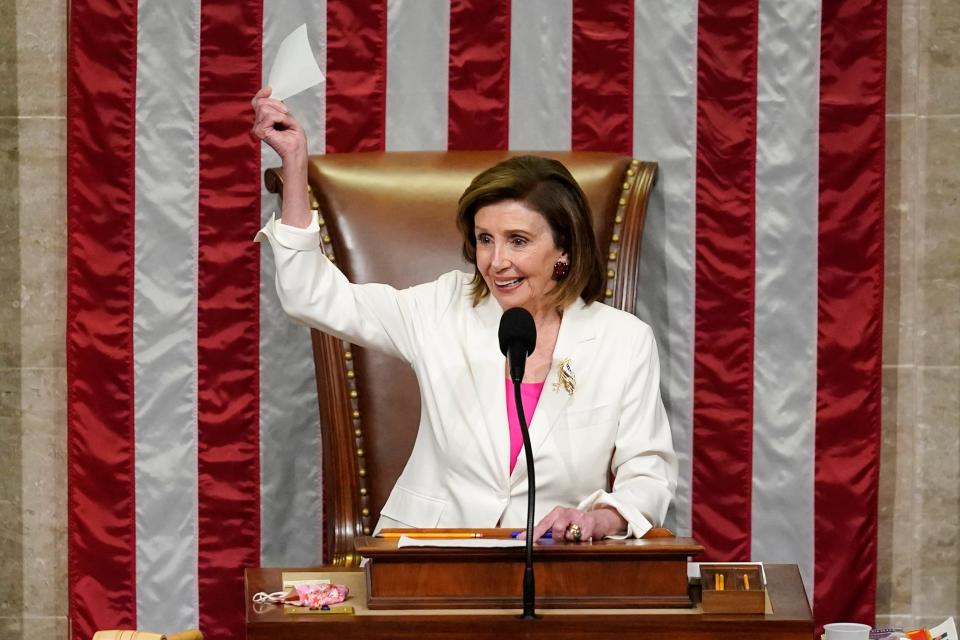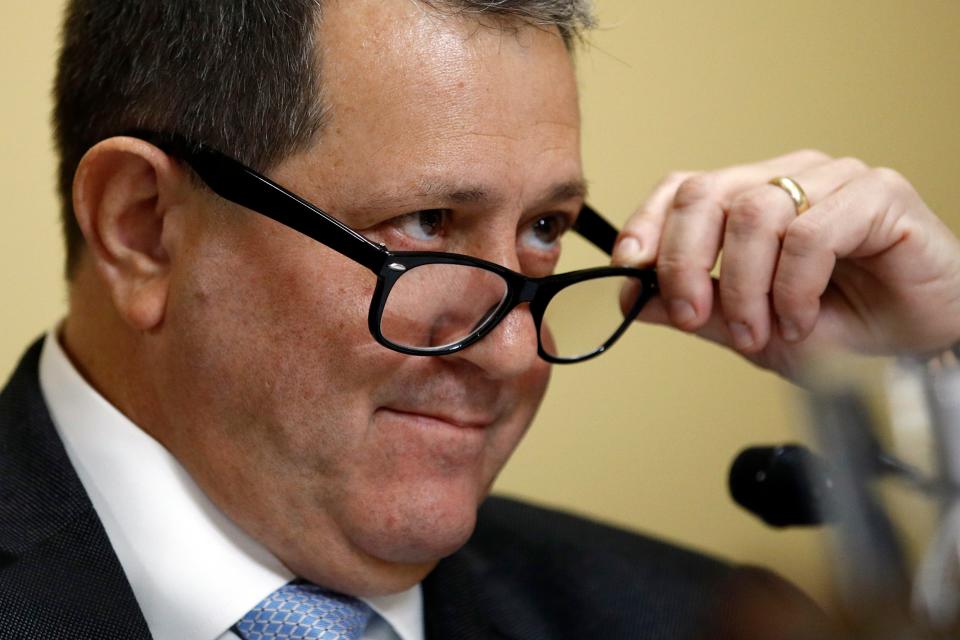Build Back Better Act passes House: What it means for New York
- Oops!Something went wrong.Please try again later.
ALBANY – The U.S. House on Friday morning passed President Joe Biden's Build Back Better Act, and Democrats in New York said it would bring back billions of dollars to the state.
The massive $2 trillion package would overhaul the nation's spending on health care, education and climate, as well as overhaul its tax structure.
In New York, roughly 87% of families with children who earn up to $150,000 a year would continue to get up to $300 monthly for each child under the age of 6 or $250 monthly for older dependents. The payments would be extended for one year under the House's bill.
“The pandemic has left too many families struggling and that is why we made a promise to provide them with support and relief they need. Today, we are making good on that promise,” Rep. Joe Morelle, D-Irondequoit, Monroe County, said in a statement.
The spending package now heads to the closely divided Senate where it faces an uncertain fate.
Among the measures that will face pushback in the Senate is the House's provision to raise the nation's cap on state and local tax deductions from $10,000 to $80,000 at the insistence of lawmakers from the New York City area where taxes are among the highest in the nation.
“I worked with President Biden to ensure this bill included an increase in the SALT deduction cap, which will lower the tax burden for upstate New Yorkers," Rep. Antonio Delgado, D-Rhinebeck, Dutchess County, said in a statement.
"This legislation makes critical investments in the future for all of us in upstate New York. I now encourage the Senate to move this process forward.”
Republicans knocked the bill, saying it spends too much, raises taxes and would hurt the nation's economic recovery from the COVID-19 pandemic.
The plan includes a 15% minimum tax on large corporations with more than $1 billion in profits, as well as a new surtax on the income of millionaires and billionaires.
"This hodgepodge of Green New Deal wish list items and subsidies for special interests undermines our free-market system and erodes the great American spirit of entrepreneurship and opportunity," Rep. Claudia Tenney, R-New Hartford, Oneida County, said in a statement.
Here are some of the key provisions and what they mean for New Yorkers:
Child care

The Build Better Back Act would limit child care costs for families to no more than 7% of income for poor families earning up to 250% of state median salary.
Democrats estimated it would help about 1 million families in New York cover more than half of their spending on childcare.
Child Tax Credit
Nationally, 35 million families would continue to receive monthly payments of up to $300 per child if they are income eligible.
The savings has been substantial for many households. About 124,000 children are eligible in Monroe County alone.
Rep. Sean Maloney, D-Cold Spring, Putnam County, estimated about 128,600 children in his Hudson Valley district would continue to receive the payments.
More: Child tax credits are coming to New York. See if you're eligible, how much you will get
Universal Preschool for ages 3 and 4
The measure would expand access to free high-quality preschool for more than 6 million children across the nation.
In New York, lawmakers expect about 300,000 children aged 3 and 4 would be eligible for pre-k through the bill's $400 billion investment over six years.
While New York City has universal pre-k, parts of New York state do not have the program.
The bill also would expand free school meals to an additional 220,000 students in New York and allow about 2 million students to get free meals over the summer through a $65 per child per month benefit.
Earned Income Tax Credit
About 1 million low-income New Yorkers without children would see a one-year extension of the Earned Income Tax Credit.
The measure provides a tax cut of up to $1,500 for workers, such as cashiers, food service employees and childcare providers.
Climate change

The goal is to reducing greenhouse gas emissions by more than 50% through a variety of tax rebates to companies.
It also includes $105 billion nationally to address extreme weather and improve resiliency to address major storms and flooding, which has been a problem along the state's coastline.
Prescription drug costs
The bill lowers the cost of prescription medication. For example, people with diabetes would not have to pay more than $35 per month for insulin.
It also would create an out-of-pocket cap of $2,000 on what seniors pay for their drugs in Medicare Part D and premiums for many who buy insurance through the Affordable Care Act, which in the state is called New York State of Health.
More: SALT fight over local and state tax deductions hits final vote. What may change
More: The Adirondacks has a new mascot: 'Adirondack Mac.' Learn all about it.
Joseph Spector is the Government and Politics Editor for the USA TODAY Network's Atlantic Group, overseeing coverage in New York, New Jersey, Pennsylvania, Maryland and Delaware. He can be reached at JSPECTOR@Gannett.com or followed on Twitter: @GannettAlbany
Support local journalism
We cover the stories from the New York State Capitol and across New York that matter most to you and your family. Please consider supporting our efforts with a subscription to the New York publication nearest you.
This article originally appeared on New York State Team: Build Back Better Act passes House: What it means for New York

